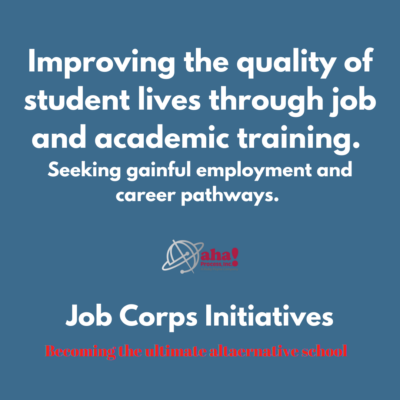The following is an edited transcript of Vern Reed, an aha! Process consultant, being interviewed by Lynn Jackson, engagement manager at aha! Process.
 Lynn Jackson: Thanks for joining me today. It’s good to see you. I am very excited to talk about Job Corps and your vision that you have for that. But for those who haven’t met you or don’t know you, why don’t you start first with a little introduction and some background?
Lynn Jackson: Thanks for joining me today. It’s good to see you. I am very excited to talk about Job Corps and your vision that you have for that. But for those who haven’t met you or don’t know you, why don’t you start first with a little introduction and some background?
Vern Reed: Thank you, Lynn. My name is Vern Reed, and I’ve been blessed to be an at-risk dude, if you will, for the last 20 years of my educational journey. During the last three years, I was the director of at-risk services for Ottumwa schools, which allowed me great access to Job Corps and other alternative situations that we can help our students with.
Lynn Jackson: I think there was a pilot program where you kind of put your thinking together. Talk to me just a bit about that before we go into talking about your vision for Job Corps and how the work at aha! Process can really be a benefit for them.
Vern Reed: I and many believe that Job Corps should and can be the ultimate alternative school in the United States. With that said, we were able to connect with the Guthrie Job Corps in Guthrie, Oklahoma, and spend a week looking at what avenues we need to take to improve processes for those students. Job Corps targets the very same students that public education struggles with. And in that process, we talked about the brain research, we talked about how we might rebrand to better get in the doors of public education, and we talked about community partnerships in a process that really can make a difference.
Lynn Jackson: As you did that pilot program, tell me some of the things you learned and also about other people in Job Corps who are looking for solutions. Talk about how you see that. What’s your vision?
Vern Reed: I’m a huge fan of Job Corps, and Job Corps has many of the same struggles that public education has, but it also has some incredible built-in advantages. We know that, post-Covid, Job Corps enrollment numbers have declined, as have so many other numbers have in the public education sector. With Guthrie, we talked about how to break that educational code in rebranding Job Corps as a partner, as opposed to someone who’s competing for students. The students that Job Corps most seeks are the very students that public education struggles with, especially in today’s world.
As we talk about graduation, which is so important, the other things we work on with Job Corps is retention. We know that Job Corps has too high of a percentage of separations without credentials. And often that happens because of the write-ups that students get on campus because of behaviors that are a direct result of the brain research that’s out there. The students at Job Corps seek and want to serve. They’re the most wonderful students in the country, but they also bring high adverse childhood experience scores. Toxic stress impacts the way the brain works. And until we understand that research and become intentional in how we apply that research, we will continue to struggle with separations without credentials, which is the exact opposite of what Job Corps is striving for.
Lynn Jackson: What does training look like?
Vern Reed: There’s so much that I’ve learned, as an at-risk dude, in a couple of different school settings, and the learning provided by aha! Process and the work of Dr. Ruby Payne allows Job Corps to better train their staff and to also better train their students. Part of what is learned is how the brain is impacted by toxic stress. That learning reduces situations that create the write-ups that get in the way of students moving forward in Job Corps.
For example, in a week we would meet with staff as we work through the brain research and how to intentionally imply the learning, and we would work with students in the same way. The idea is that if we create a partnership of staff and students who better understand the why of what’s getting in the way, based on toxic stress and its impact on the brain, we can increase our ability to have more success with students across the board. In the same way, we can help increase our enrollment.
For further information, contact Lynn Jackson at ljackson@ahaprocess.com.








